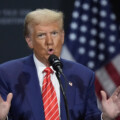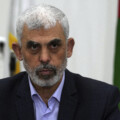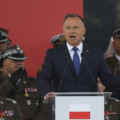In this week’s Hub book review, Patrick Luciani examines Israel Alone (Wicked Son Books, 2024) by Bernard-Henri Lévy, which seeks to understand why Israel once again finds itself under attack and marginalized on the world stage.
On November 10, 1975, the UN General Assembly passed resolution 3379 that “Zionism is a form of racism and racial discrimination.” A majority of Muslim and Arab states—with the Soviet Bloc—were able to do on the international stage what they couldn’t do on the battlefield: isolate Israel.
U.S. Ambassador to the UN Patrick Moynihan called the UN resolution an “infamous act” in a time when the U.S. administration was more determined to support Israel. Canada also voted against the resolution, showing we once stood on principle.
Equating Zionism with racism was an act of pure antisemitism and hypocrisy by the UN, which recognized Israel as a Zionist state on May 14, 1948. Israel was attacked immediately by its neighbours without any help from the UN.
Resolution 3379 was not the first against Israel. Arab states have traditionally bought off African and third-world countries to isolate Israel. Between 2015 and 2019, the UN passed more resolutions against Israel than against Syria, Iran, North Korea, and Russia combined.
Why the hatred of Israel by Arab and Muslim countries? First is a renewed rise of a virulent form of antisemitism. A cosmic hatred of Jews so prevalent in Christian Europe that included the blood libel, the protocols of Zion, and a myriad of other international Jewish conspiracies is now standard fare in the Middle East. It is a hatred that pursued the Jews from Babylon to Persia, spread through Islam and Europe and has now settled throughout the West and in the mentality of Columbia undergraduates.
Second is the failure and humiliation of Arab countries losing battle after battle against Israel. Jews who were once subservient to Muslims have slipped out of their grasp and are now prospering without the oil wealth endowed by nature that keeps the Arab leaders in power.
Arab leaders, including Haj Amin Al-Husseini (the grand mufti of Jerusalem and pal of Adolf Hitler who wanted to do to Jews in Palestine what Hitler did in Germany and Poland), Gamal Abdel Nasser of Egypt, Saddam Hussein in Iraq, and Yasser Arafat, the founder of Fatah, have imagined a pan-Arab world that would drive the Jews into the sea. The late Lebanese-born scholar Fouad Ajami, in his book Dream Palace of the Arabs, shows how this aspiration was an illusion bound to fail as these dreamers pursued a perverted form of nationalism and fevered desire to destroy Israel. They chose to dig tunnels, launch missiles, and teach their children to hate rather than develop and enrich their own societies.
Today’s Arab dreamers, Bashar al-Assad, the now-dead Yahya Sinwar, and Hassan Nasrallah, also had fantasies of following Saladin, who drove the Crusaders from Jerusalem in the 12th century. But Morocco, Sudan, the UAE, and Saudi Arabia, the wealthiest of all the Middle Eastern countries, are coming to realize that Egypt and Jordan were correct: it is better to trade with than fight Israel.
Hamas tried one more time to unite the Arab world by indiscriminately and without conscience or mercy slaughtering some 1200 Jews and taking some 250 hostages last October 7, hoping it would be the catalyst toward Arab and Muslim unification. It didn’t work. It has, however, unleashed latent antisemitism throughout Western universities, the media, and cultural institutions.
In a new book, Israel Alone, Bernard-Henri Lévy (BHL), a writer, philosopher, journalist, and filmmaker who has travelled the world trying to make sense of senseless conflicts, turns to his beloved Israel. BHL has written a poetic and spiritual defence of Israel and his efforts to understand the events of October 7. He tries to understand why the West has been reluctant to acknowledge the paradox of evil and why Israel has found few friends when it most needs the moral support of the world.
While Hamas held their captives in deplorable conditions, not hesitating to torture and kill them if IDF commandos got too close, BHL reminds us that the Mishneh Torah states that the “freeing of captives is among the most holy of the mitzvot, a sacred duty, a mission one cannot shirk.”
Hamas, with its allies in the West and money pouring into elite universities from Qatar and Saudi Arabia, convinced many that this struggle was inflicted on the weak and poor by the strong and prosperous through the illusionary theory of colonialism and the evils of Zionism.
Compounding the catastrophe was the spreading violence on Jews and Synagogues worldwide while the media hoisted the false flag of rising Islamophobia. Commentators continually demand that Israel and Netanyahu stand down while asking nothing of Hamas.
BHL, a secular Jew, laments not only the injustice and barbarity of that October day but the forced isolation of Israel by governments around the world, including Spain, the U.K., and his own country, France, when President Emmanuel Macron imposed an embargo on military equipment to Israel. Macron now reminds Israel that it was created by the UN and must somehow be obedient to an organization that has tried to stifle Israel’s every move to defend itself.
The attack on Israel, despite its many military successes against Hamas and Hezbollah in the past few weeks, has reawakened an antisemitism that was unimaginable after the Holocaust. Indeed, what should be unambiguous victories for all free peoples and for Palestinians hoping to live in peace—the killing of the terrorist leader Sinwar and the elimination of the Hezbollah leadership—have too often been greeted with venom instead of appreciation. Liberalism, which once aspired to protect the rights of minorities, is now failing the Jews.











